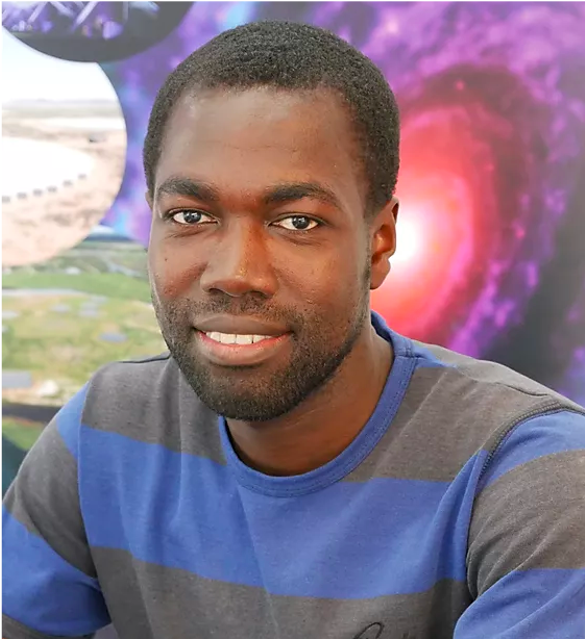Student profile: Emmanuel Bempong-Manful

What is the main topic of your research?
What are you aiming to do and how does it relate to other work in your field?
My topic is the bases of extragalactic radio jets. I am mapping the inner structure of a sample of powerful extragalactic radio jets in order to resolve the jet outflows. Of particular interest to my work is the measurement of the synchrotron spectra - to constrain the nature of jet-particle acceleration and energy losses, and polarisation of the radio signals - to determine the orientation and degree of ordering of magnetic field in the jet (the synchrotron radiation polarisation) and in the foreground gas (via Faraday rotation). My work forms part of an ongoing global collaboration (e-MERLIN Jets Legacy project) to resolve key questions in extragalactic jet physics.
The results will provide new insights into the physics driving the observed jet structure in extragalactic radio sources and allow for new constraints on jet physics.
How far along the journey are you? First year, second year, writing-up etc.?
What has the journey been like so far?
I am in the final year/writing up stage. When I started some three years ago, I had a well-thought-out and ambitious plan to publish 3-4 first author papers during my PhD – to me this was the ‘perfect’ plan I would say! It’s safe to say that has not happened for various reasons, but it’s OK and completely normal as I have realised that the PhD journey is not a 100% upward trajectory; there are periods of enormous progress and not so productive periods.
Despite things not being as I planned at the start of the programme, I feel I have learnt a lot, broadened my horizon and developed as an early career researcher over these past 3 years, and I am confident of taking the next step in my career in research/academia.
I am also very fortunate to have successfully led the organisation of two international astronomy conferences, and contributed to several science meetings through talks and poster presentations; I have also been awarded over $35,000 in funding as PI/Co-I of different science projects; and 54 hours of telescope observing time as PI/Co-I.
Additionally, I have been part of student leadership team (Bristol SU) throughout this journey, working with the Bristol Doctoral College (BDC), School and Faculty PGR Directors and academics and University Management team to design and implement policies to support the University’s PGR community, EDI strategy, and the overall future direction of the University. These altogether have provided me with invaluable interactions and learning opportunities, and enriched my leadership experiences for the future – and I couldn’t have asked for more!
What attracted you to the research opportunities at Bristol?
Like many other research degree students, the research project offered by Bristol was a major attraction to me as it fit in well with my overall research goals and ambition. Also, the opportunity to conduct scientific research at the highest level at a top UK research intensive (and Russell Group) University, as well as the prospect of both working under my supervisor Prof. Mark Birkinshaw (who is arguably one of the very best in his field globally) and within the active astrophysics group here at Bristol, was very attractive to me.
What is Bristol like as a place to live?
I have been fortunate to visit and live in a few cities around the world and I can confidently say that Bristol is a great city to live in. The people are very nice and friendly and literally come from all walks of life. The city also boasts a beautiful and diverse landscape, parks, good transport links and high streets with some of the finest pubs, restaurants, cafés and shops you will find in the UK. Sports, music, arts and tech is also a big thing in the city, and all of these make Bristol a lively place to live – there is simply something for everyone and so much to do!
What was it like starting a research degree as a new student?
What advice would you give to someone thinking about doing a research degree in Bristol Physics?
Starting a research degree as a new student was an exciting feeling, and my experience was made even better by the support I received from the school, my supervisor and astrophysics group which made me feel welcomed and integrated into the group effortlessly.